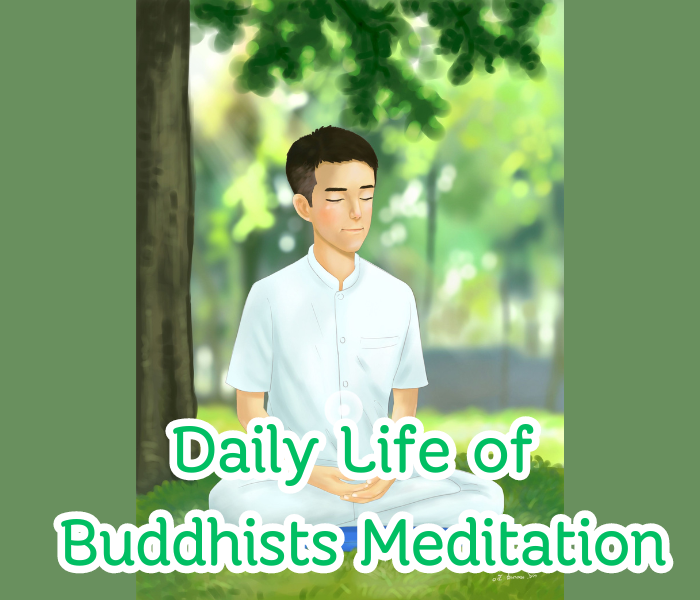
Monica : What do Buddhist’s scriptures say about time?
Luang Por : Time management for laypeople and Buddhist monks is quite different. Laypeople have to manage their time in order to achieve both worldly and spiritual development. Every morning they will pray, meditate and share merit with all living things after they get up. All day long, they will observe their mind; work with full consciousness and wisdom while encountering problems from their work or their lives. Before bed, again it is the time for prayer and meditation in order to free their mind from stress and all the problems they have faced during the day. When they go to bed, they will have a sound and peaceful sleep. All laypeople should know their life goal is that they were born to achieve nirvana, so that they can balance their material and spiritual activities. These are daily activities for general laypeople. In addition, every fortnight on the full-moon day, committed Buddhists will visit the temples and listen to a sermon, meditate, and make merits. Also, on special days in Buddhism such as Visakha Puja Day, Asarnha Puja Day, Buddhist Lent Day, the end of Buddhist Lent Day, and every Buddhist observance day, they will join Buddhist ceremonies at the temple and observe eight precepts.
Monica : I just wonder, the perception of Thais must be so different inside here. Can you describe an ordinary day for a Buddhist monk?
Luang Por : People who decide to be Buddhist monks undoubtedly want to liberate themselves from sufferings, and attain Nirvana like the Lord Buddha who terminated birth. Therefore, all days and nights, Buddhist monks practice the duties of monkhood to completely eradicate their spiritual defects. Early in the morning, Buddhist monks pray and meditate. Then, they leave the temples to go on alms rounds. After that, they clean their place and study the Lord Buddha’s teachings both by reading the scripture and practicing meditation. In the evening, they also clean the place, say a prayer, and perform meditation to clear their mind with the goal to eradicate defilements. Every fortnight on the full-moon day, Buddhist monks give sermons to teach the people coming to the temples.
Monica : How much time do you spend meditating every day?
Luang Por : I meditate twice a day--when I close and open my eyes; when I inhale and exhale. In every manner even sitting, standing, lying, walking or doing anything, I can keep meditating naturally and automatically because I have practiced it this way since I got ordained. I can focus my mind on my inner peace despite my outward movement. It is like the road that lays still even when there are cars running on it, or the sky that is fixed in its place even when clouds are floating by. It became my habit to meditate by focusing my mind at the center of my body, all the time in every activity.
Monica : Yes ok. How does this meditating affect the rest of your day?
Luang Por : The benefits of twenty-four hour meditation are that it makes me happy and joyful. It gives me awareness and wisdom which enable me to extinguish my own sufferings. Consequently, I am willing to help other people every day. I use the knowledge from meditation to help people by teaching them about the causes and effects of their deeds which is called “the law of karma”. I spread this knowledge, via the DMC channel, to help people around the world find true happiness. I do all these things out of happiness, goodness of the heart, with full-conscience and wisdom.
Monica : If you don’t meditate, is there any difference?
Luang Por : People who do not meditate lack strength of the mind. Their mind will be exposed to confusion, sadness, boredom, stress, hollowness, anxiety and many troubles because there is nothing to empower or protect their minds from everyday life’s problems.